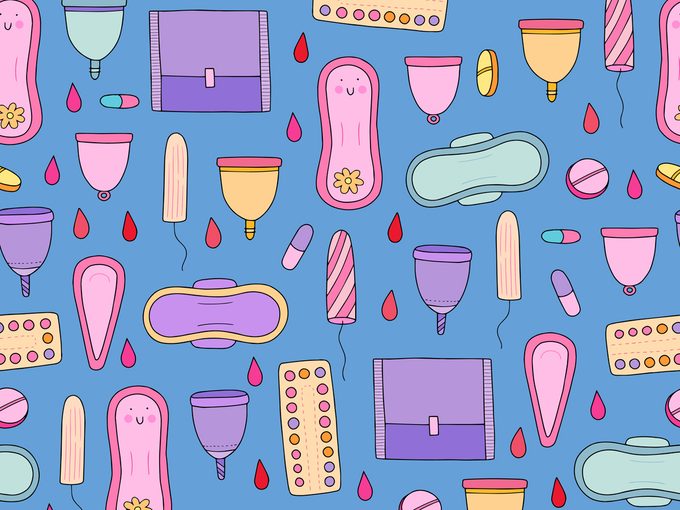Is It Time To See a Doc About Your Heavy Period?
You could actually be suffering from a treatable medical condition called menorrhagia.

How to stop heavy periods
A monthly period is never fun, but for some women it can be nearly unbearable. According to Heavy Period Talk, one in five women experience heavy blood loss, pain and exhaustion each month that disrupts daily life. But more than half of these women don’t realize that their heavy menstrual bleeding is actually a treatable medical condition called menorrhagia. We asked Dr. Yolanda Kirkham, an obstetrician-gynecologist at St Joseph’s Health Centre and Women’s College Hospital in Toronto, for advice on this all-to-common problem.
What are the signs or red flags of heavy periods (aka menorrhagia)?
We can think of periods in terms of flow, timing of pad changes, and physical, emotional, or social impact. Signs or red flags for heavy periods are menstrual bleeds that require more than 3-5 pad, tampon, or menstrual cup changes per day or changing during the night. If the flow lasts more than 7 days, has a lot of clots, or causes any physical symptoms such as cramps, feeling drained or lightheaded, or extreme fatigue, these are also signs to see a doctor. Periods that restrict a woman’s ability to go about her regular activities are also abnormal. Examples including needing to miss work or school, and cancelling or not accepting social activities for fear of leaking. Periods that have an emotional impact (think: anxiety, depression, isolation) or negative effect on quality of life should also be checked out. If you can’t wear light-coloured clothing during your period, this is also a sign of heavy periods! (Related: What women need to stop believing about their hormonal health.)
Unfortunately, women suffer for years thinking that it’s normal for them to have the above symptoms, or they have learned to live with their heavy periods.
If you feel you are bleeding too much, too long, or too frequently, it’s time to see your doctor! Periods don’t have to cramp your style. (Related: 13 things you vagina wants to tell you.)
What sort of treatment options are available?
There are many options for treatment of heavy periods. A treatment plan can be individualized for each woman. Depending on the cause of heavy periods, treatments can be in the form of medication, clinic procedures, or minimally invasive surgery.
Medications
Medications that can be used on an as-needed basis include non-steroidal anti-inflammatory medications such as naproxen (which can be bought at the drug store), or tranexamic acid by prescription to dramatically reduce flow. Any birth control type medication is also period-control medication and will help to reduce flow and cramps. Birth control pills, patches, vaginal rings, or injections can be used. And yes, these can be used in an extended way to skip periods especially if it’s more harmful to have heavy periods. A long-lasting hormone releasing intrauterine device (IUD) can also be inserted in the office to reduce period flow and pain. (Here’s how to make your IUD insertion hurt less.)
Endometrial ablation
Short day procedures called endometrial ablation can also be performed to remove the uterine lining for women who don’t want to, or have completed child-bearing. Ablation can significantly decrease bleeding in women without polyps or fibroids.
Hysterectomy
Hysterectomy (surgery to remove the uterus) is now regarded as a last resort for women who have not responded to the other less invasive options. I would encourage women to speak with their doctor about safe options that best suit their needs and health condition. (Related: Why Lena Dunham had a hysterectomy at 31.)
What’s your advice to women who are worried about their health care practitioner brushing off their concerns about their period?
Let your health care practitioner know how your periods affect you. Share your story about needing to change bed sheets or having leakage accidents at work or missing out on time with loved ones because of your monthly period. If you dread your period and it’s more than a nuisance, you’re not alone. Heavy periods affect women of all ages including young teens and especially women nearing menopause. Blood is precious. Make it a priority to address a recurring problem that can happen nearly 500 times over 40 years of periods! Women can anonymously share their stories at www.heavyperiodtalk.ca. Each story shared helps other women realize how common this problem is, and also supports the Canadian Foundation for Women’s Health.
Next, don’t miss 15 things you gynecologist secretly wants to tell you.




